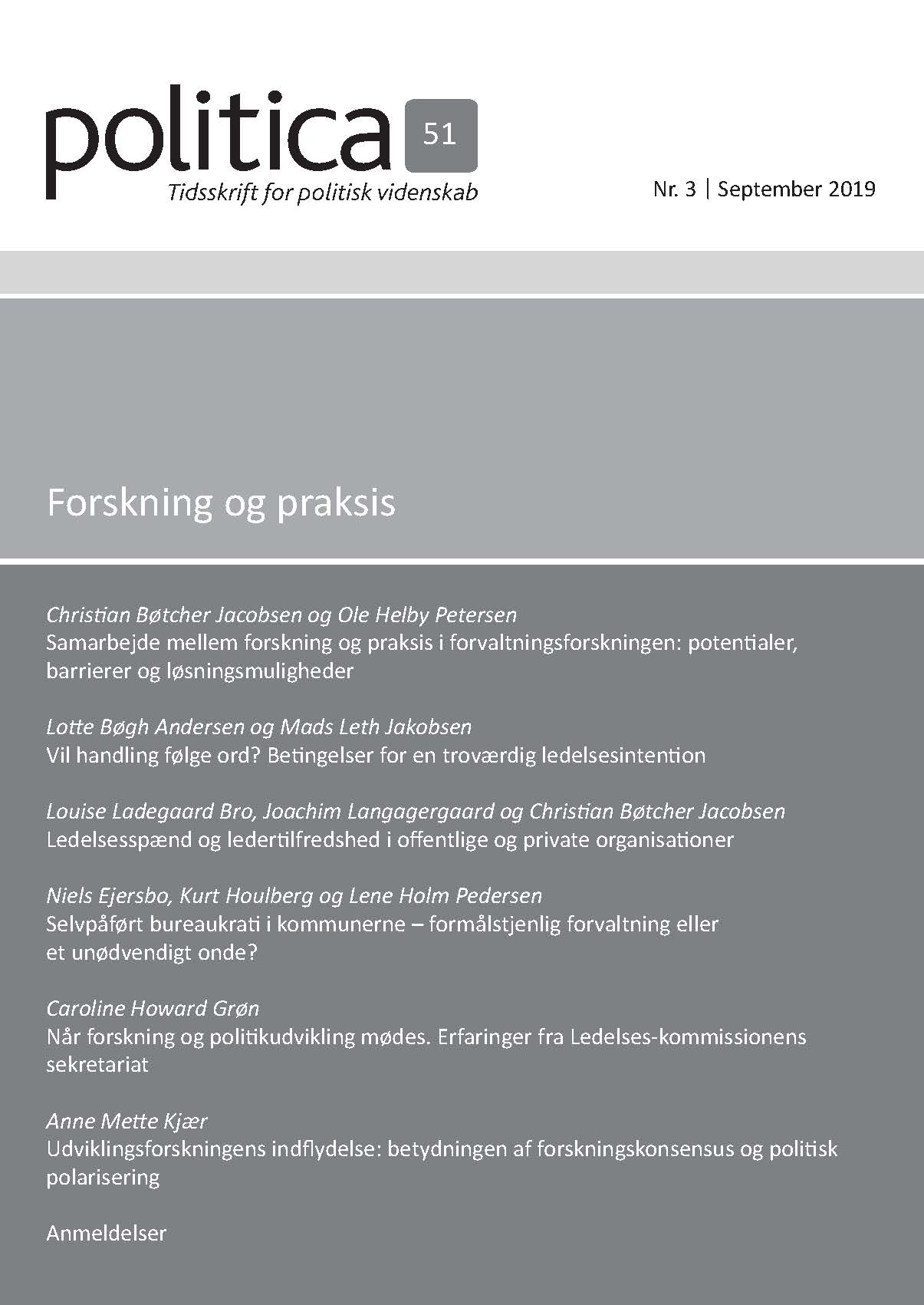Vil handling følge ord? Betingelser for en troværdig ledelsesintention
DOI:
https://doi.org/10.7146/politica.v51i3.131156Resumé
Snak uden handling er ofte både billig og temmelig virkningsløs. Når ledere kommunikerer en ledelsesintention til deres følgere, er troværdigheden af intentionen derfor vigtig, hvis intentionen skal påvirke følgernes adfærd. Denne artikel udvikler en teori om troværdighedsbetingelser for ledelsesintentioner. Troværdighedsbetingelserne er gode, hvis de institutionelle rammer, lederens karakteristika og mål samt dennes tidligere adfærd gør det plausibelt, at nuværende og fremtidige ledere både vil og kan sikre intentionens gennemførelse. Til forskningen genererer artiklen empirisk testbare forventninger til troværdighedsbetingelser og deres effekter. Til ledelsespraktikere giver artiklen et sprog til at arbejde med troværdigheden af egne ledelsesintentioner.
Referencer
Andersen, Lotte B. og Mads Leth Jakobsen (2011). Does ownership matter for the provision of professionalized services? Hip operations at publicly and privately owned clinics in Denmark. Public Administration 89 (3): 956–974.
Andersen, Lotte B., Anders Boesen og Lene H. Pedersen (2016). Performance in public organizations: Clarifying the conceptual space. Public Administration Review 76 (6): 852-862.
Boudett, Kathryn P., Elisabeth A. City og Richard J. Murnane (2013). Data Wise: A Step-by-Step Guide to Using Assessment Results to Improve Teaching and Learning. Cambridge: Harvard Education Press.
Boyne, George A. (2002). Public and private management: What’s the difference? Journal of Management Studies 39 (1): 97-122.
Bozeman, Barry og Stuart Bretschneider (1994). The “publicness puzzle” in organization theory: A test of alternative explanations of differences between public and private organizations. Journal of Public Administration Research and Theory 4 (2): 197-223.
Chapman, Carrie, Heather Getha-Taylor, Maja H. Holmes, Willow S. Jacobson, Ricardo S. Morse og Jessica E. Sowa (2016). How public service leadership is studied: An examination of a quarter century of scholarship. Public Administration 94 (1): 111-128.
Churchill, Winston S. (1949). The Second World War. London: Cassel.
Dietz, Graham og Deanne N. Den Hartog (2006). Measuring trust inside organisations. Personnel Review 35 (5): 557-588.
Dixit, Avinash K. og Barry J. Nalebuff (1991). Thinking Strategically: The Competitive Edge in Business, Politics, and Everyday Life, 4. udg. New York: Norton.
Forsvaret (2008). Forsvarets ledelsesgrundlag. København: Forsvarskommandoen.
Grant, Adam M. og John J. Sumanth (2009). Mission possible? The performance of prosocially motivated employees depends on manager trustworthiness. Journal of Applied Psychology 94 (4): 927-944.
Hvidman, Ulrik og Simon C. Andersen (2014). Impact of performance management in public and private organizations. Journal of Public Administration Research and Theory 24 (1): 35–58.
Jacobsen, Christian Bøtcher og Ole Helby Petersen (2019). Samarbejde mellem forskning og praksis i forvaltningsforskningen: potentialer, barrierer og løsningsmuligheder. Politica 51 (3): 269-287.
Jakobsen, Mads L. (2019). Buy-in to a credible vision! Why leaders make prospector responses to learning-oriented performance reform. Public Organization Review, 1–23. doi: 10.1007/s11115-019-00438-4.
Jan, Stephen (2003). A perspective on the analysis of credible commitment and myopia in health sector decision making. Health Policy 63 (3): 269-278.
Jørgensen, Annemette S. og Flemming Poulfelt (2013). Den gode leder er troværdig. Lederne 97 (4): 14–16.
Kouzes, James M. og Barry Z. Posner (2012). The Leadership Challenge: How to Make Extraordinary Things Happen in Organizations, 5. udg. San Francisco, CA: Jossey-Bass.
Mahler, Julianne og Maureen H. Casamayou (2009). Organizational Llearning at NASA: The Challenger and Columbia Accidents. Washington DC: Georgetown University Press.
Miller, Gary (2000). Above politics: Credible commitment and efficiency in the design of public agencies. Journal of Public Administration Research and Theory 10 (2): 289-327.
Miller, Gary (2005). The political evolution of principal-agent models. Annual Review of Political Science 8: 203-225.
Moore, Mark (1994). Public value as the focus of strategy. Australian Journal of Public Administration 53 (3): 296-303.
North, Douglass C. og Barry R. Weingast (1989). Constitutions and commitment: The evolution of institutions governing public choice in seventeenth-century England. The Journal of Economic History 49 (4): 803-832.
Ohlsson, Anders (2009). Grundlæggende kommunikationsmodeller, pp. 27-49 i Jørn Helder, Torbjörn Bredenlöw og Jens L. Nørgaard (red.), Kommunikationsteori: En grundbog, 1. udg. København: Hans Reitzel.
Orazi, Davide C., Alex Turrini og Giovanni Valotti (2013). Public sector leadership: new perspectives for research and practice. International Review of Administrative Sciences 79 (3): 486–504.
Porter, Michael E. og Thomas H. Lee (2013). The strategy that will fix health care: providers must lead the way in making value the overarching goal. Harvard Business Review 91 (10): 50-67.
Rainey, Hal G. og Barry Bozeman (2000). Comparing public and private organizations: Empirical research and the power of the a priori. Journal of Public Administration Research and Theory 10 (2): 447-469.
Sant, Seema (2016). An analysis of credibility of CEOs in an organisation linkage with employee engagement. Asian Social Science 12 (10): 127-135.
Serritzlew, Søren (2006). Linking budgets to activity: A test of the effect of output-purchase budgeting. Public Budgeting & Finance 26 (2): 101-120.
Simon, Herbert A. (1985). Human nature in politics: The dialogue of psychology with political science. The American Political Science Review 293-304.
Vogel, Rick og Doris Masal (2015). Public leadership: A review of the literature and framework for future research. Public Management Review 17 (8): 1165-25.
Wright, Patrick M. og Lisa H. Nishii (2007). Strategic HRM and organizational behavior: Integrating multiple levels of analysis. CAHRS Working Paper Series 468.
Yukl, Gary (2010). Leadership in Organizations, 7. udg. Upper Saddle River: Pearson.
Yukl, Gary (2012). Effective leadership behavior: What we know and what questions need more attention. The Academy of Management Perspectives 26 (4): 66-85.
Downloads
Publiceret
Citation/Eksport
Nummer
Sektion
Licens
LicensOphavsretten tilhører Politica. Materialet må ikke bruges eller distribueres i kommercielt øjemed.





